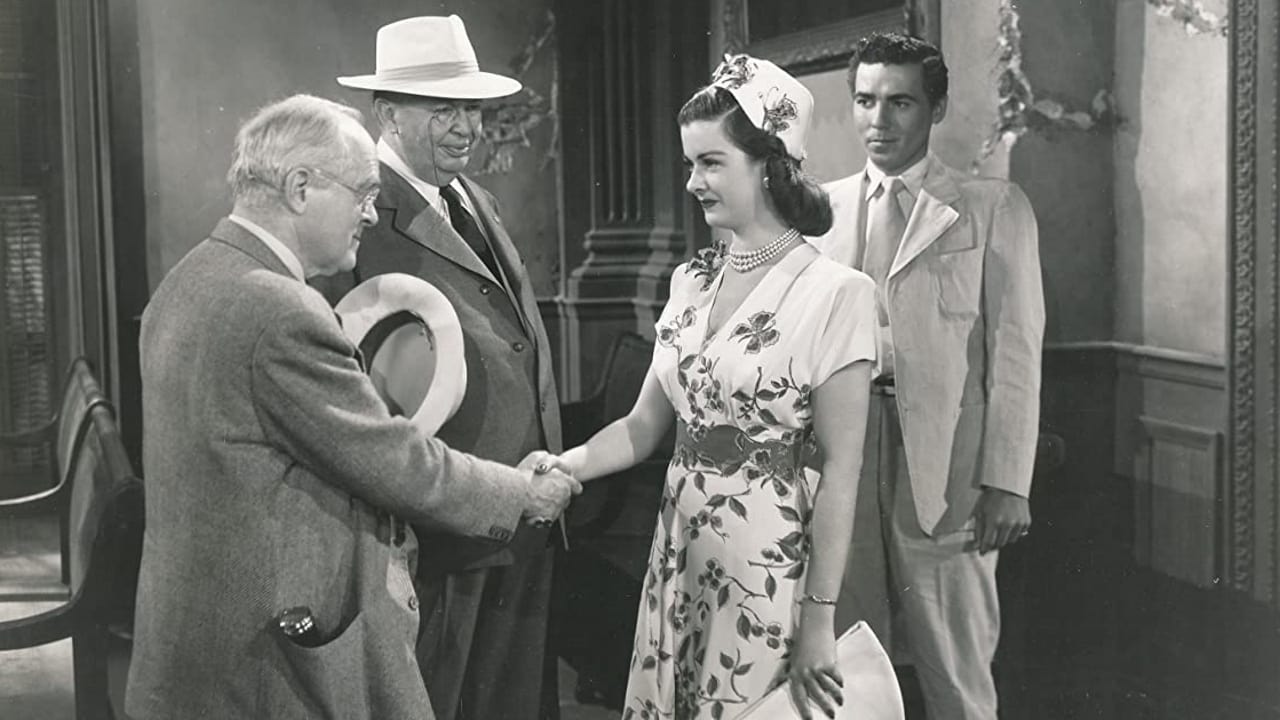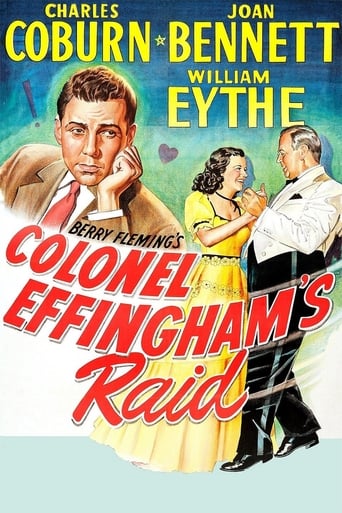

An Army colonel retires to his childhood home in 1940 Georgia in this 20th Century Fox film. Released in January 1946, this is one of the first films made after World War II. The war is just beginning in this story that's based on a novel by Berry Fleming. The story is about the colonel, Will Seaborn Effingham, played by Charles Coburn. It's seen through the eyes of his second cousin once removed, Albert Marbury (played by William Eythe). The setting is the fictitious town of Fredericksville, Georgia. Cousin Willie (the colonel) asks Albert about Fredericksville, and Albert says it's "just like any of a hundred towns in Georgia." The colonel asks, "What's the population now?" Albert says, "Oh, about 30,000." The colonel asks, "How many voted in the last election?" Albert answers, "Oh, four or five thousand, I'd say." The colonel then says, "You mean 25,000 took no part in the action?" I don't know if that was supposed to be part of the comedy – implying that the entire population of the town was of voting age. If not, it was a gaffe on the part of the screenplay. The latter may be the case, because the script for this film is weak. It seems disjointed and not well tied together. The comedy is very light, and it's even amateurish in places. In three scenes where Albert notices Ella Sue's legs (Joan Bennett), the film has a weird and clumsy whistle sound over. The colonel takes on the local pols when he writes a column for one of the two town's newspapers. Albert happens to work for it as a reporter. Ella Sue is the society editor. This could have been a very good film with a tight script and some crisp, fresh dialog and humor. But, it's a nap time film, mostly. The only reason to watch it is for Charles Coburn and Thurston Hall – one of the best early Hollywood character actors of bombast. He's the bloated mayor of the town. They are the only two who have worthwhile roles and seem to give them some effort.Eythe's Albert is mostly droll throughout. His part may have been written that way in the book. Whether or not, it comes across that way. He just comes to life in a closing scene. Joan Bennett's Ella Sue was well below her talent and abilities, and the rest of the cast are forgettable. See the Quotes section under this IMDb Web page on the movie for the few funny lines. My favorite line in the film is is one by the colonel: "A community's history is its family tree."
... View MoreThe main reason I saw this film is that it starred the wonderful character actor, Charles Coburn. Well, in this sense, I wasn't disappointed as once again Coburn played the sort of crotchety but lovable guy he so often played in films. However, sadly the film seemed like it was very strongly inspired by MR. SMITH GOES TO WASHINGTON (so it loses points for originality) and it unfortunately ended way too abruptly--like they knew it was supposed to be a B-picture so they ended it because this format wouldn't allow for a longer film! The film begins with the Colonel (Coburn) retiring to his childhood home in Georgia. Instead of just sitting back in a rocking chair, however, he wants to do a newspaper column to keep himself busy. At first, the column is very well received. However, when Coburn begins attacking the local corrupt administration, things start to get kind of crazy and soon it's this character and his new friends versus the establishment. This is all sort of a history lesson on politics and grassroots politics and when the mayor and his cronies dig in their heels for a fight the film gets interesting. Oddly, however, after setting up this great confrontation, it just seems to end! In the matter of just a couple minutes, everyone agrees to Coburn's demands and they all live happily ever after!! What a letdown at the end.Overall, a pleasant and entertaining film that is worth watching but could have been even better. Excellent characters but a limp finale make this more of a nice time-passer than anything else.
... View MoreCharles Coburn plays a lovable old veteran who returns to his hometown of Fredricksville, Georgia as World War II commences. There, he finds nephew William Eythe, who helps facilitate a job for his uncle on the town newspaper. Also on staff is society gal Joan Bennett. Mr. Coburn uses his newspaper column "On the Firing Line" to rally the townspeople - he wants to save an old town Courthouse from being torn down, and replaced. Can he rally the townspeople to save the monument from demolition? Although the Courthouse in danger is a Confederate Courthouse, there is no political agenda offered by the film - it's simply a story about weeding out political corruption, and preserving an old building. There is, however, a stereotypical servant (called "Orderly 98") who isn't too hard to take until his offensive fencing scene with Coburn. The "whistle" which accompanies close-ups of Ms. Bennett's legs is ridiculous. Don't expect authentic Georgia accents. A nice idea, and a competent cast, aren't enough to lift this "Colonel Effingham's Raid". *** Colonel Effingham's Raid (1/24/46) Irving Pichel ~ Charles Coburn, Joan Bennett, William Eythe, Thurston Hall
... View MoreCharles Coburn is his usual wonderful self. He is in a hurry, as he says `at 65, you have to be in a hurry'.A charming and funny `surprise' film - the surprises are all the little points of humor, which keep occurring throughout the film usually as punctuations to the events. A `Greek chorus' comments on Joan Bennett's legs, a character continually passes out `repent' cards to characters, mostly the politicians, and look for the sleeping husband in the background of one scene. A little heavy on the Southern touches for our current politically correct times, but not too bad in this regard. The ending is a little abrupt, but all in all, a very enjoyable film.
... View More